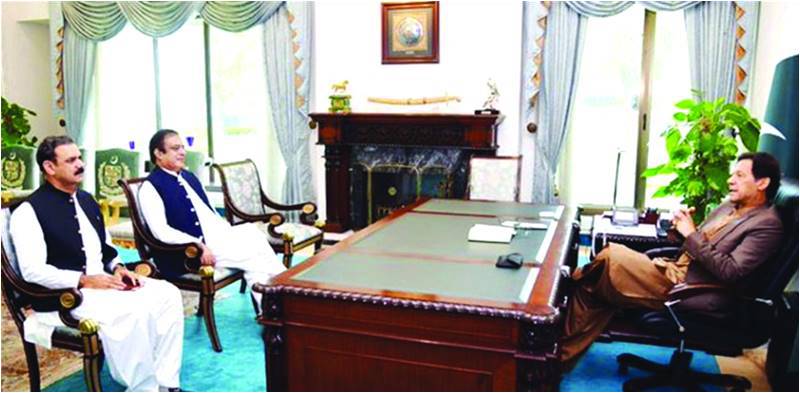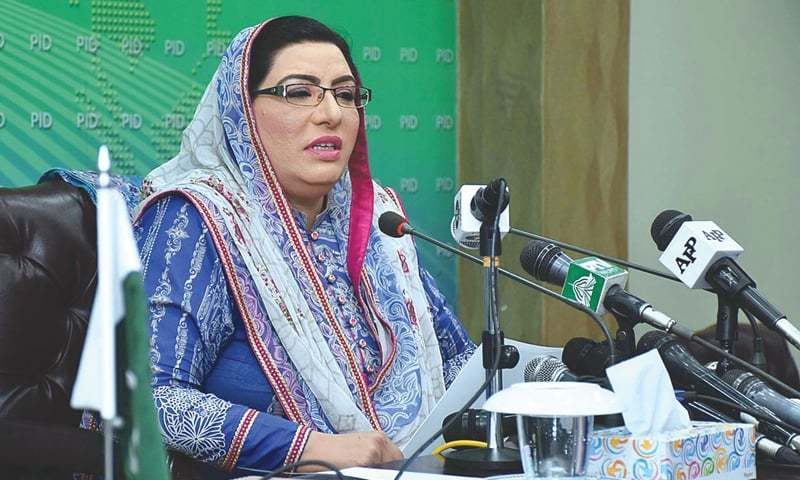
Shuffling the team of media managers appears to be the favorite tool in the hands of our prime minister when faced with a steep decline in his popularity. Media managers are blamed too readily for failing to manage ‘public misperceptions’ and handling a ‘hostile media.’ It has happened in the past also. It is not realised that public criticism may also be due to policy failures and temperamental shortcomings of the leader, more than the failure of media managers.
In April last year, the prime minister removed Fawad Chaudhry from the information portfolio, sending him to Ministry of Science and Technology. Obviously the change implied that the media team leader either lacked competence or credibility, or both. The messenger, not the message, was responsible, so the prime minister must have thought then.
Holding only the messenger responsible, the prime minister has once again shuffled the information pack. Special Advisor to Prime Minister (SAPM) Dr Firdous Ashiq Awan has been replaced with Senator Shibli Faraz and ex DG ISPR Gen Asim Bajwa brought in as SAPM on Information. The prime minister does not seem to realise that the problem actually may be in the messages he himself has been sending about his persona and policies, rather than in the messengers.
This is not to suggest that the public image as well as professional competence of the messenger is of no consequence. Along with the soundness of policies and the leader’s temperament, the face of the messenger is also important. The choice of Firdous Ashiq Awan as the messenger was wrong in the first place. As a critical team player, information minister must also be acceptable to other team members, not merely to the prime minister. Firdous Ashiq hardly fitted in that category.
Like all migratory political birds pursuing only personal interests, she was never welcomed in the inner party circles, where she was perceived as an outsider at best and an opportunist at worst. The instant reaction of some of the party leaders on her replacement reinforces this view.
Dr Awan served General Musharraf as cabinet minister and had no qualms defending the military dictatorship. She then joined the PPP nest to defend the 18th Amendment, condemn military dictatorships and uphold parliamentary supremacy. She joined the PTI just a few months before the 2018 general elections but lost it to PML-N candidate Subhani by a huge margin of nearly 40,000 votes. How could she be acceptable to core party members as minister, or how could she sound credible?
The new information minister, Shibli Faraz - the son of illustrious Ahamd Faraz - is no expert in media management. But he is a bona fide original PTI member and largely regarded as an honorable man. He is not known to cherish telling lies with a straight face, nor has the reputation of being offensive in his bearing and demeanor. These traits should stand him in good stead but he, too, is unlikely to succeed because of the mercurial temperament of the prime minister and his flawed policies.

Bringing in General Asim Bajwa as SAPM on Information seems based on the assumption that as DG ISPR Bajwa had built a highly favorable public image of General Raheel Shareef. But the assumption that Bajwa will succeed doing the same for Imran as well is naive and ignores some basic realities.
Asim Bajwa built General Raheel into a larger than life figure but only as long as both he and Raheel wore uniforms and no questions were asked. It was not difficult to make people believe that Raheel Shareef had turned down an offer of extension in service. Since both were in uniform, no one questioned why the announcement was made 10 months in advance that Raheel had declined the extension. No one asked whether the extension had actually been offered. No one asked who launched the campaign ‘Jaane ki baatain jaane do,’ urging Raheel to forget about quitting.
Raheel’s acceptance of the Saudi offer to command the Islamic Military Alliance created a perception at the time that the advance announcement of not accepting extension was actually a signal to the Saudis that he was available. But no one asked questions because both wore uniforms.
Bajwa also portrayed a highly positive image of Raheel when the latter surrendered his one-kanal plot to the Army Shuhada Fund. But later, when Raheel got 90 acres of prime land in Lahore as post-retirement benefit and the image of a larger than life figure came cropping down it benefitted none.
The prime minister’s assumption is seriously flawed for two reasons. First, that Bajwa without uniform will be able to deliver as efficiently as when he was in uniform. Second, it ignores that false white washing can actually do more harm than good, not only to individuals but to the state as well. Imran Khan is wrong in thinking that Bajwa will white wash his image overnight.
Merely shuffling persons in the information pack will not deliver unless the image problem is addressed. Imran Khan has sheltered in his cabinet a dozen political turncoats from opposition parties whom he had accused of massive corruption. He seems to believe that everyone in the country is corrupt. That he alone is incorruptible. Those around him also cannot be corrupt because he believes he himself is not corrupt. He suffers from the delusion that he alone can change the fate of the nation. He feels free to insult political opponents because he mistakenly thinks it demonstrates his sincerity and conviction.
Imran Khan’s real dilemma is his mindset, his temperamental shortcomings; not the pack of his information team.
The writer is a former senator
In April last year, the prime minister removed Fawad Chaudhry from the information portfolio, sending him to Ministry of Science and Technology. Obviously the change implied that the media team leader either lacked competence or credibility, or both. The messenger, not the message, was responsible, so the prime minister must have thought then.
Holding only the messenger responsible, the prime minister has once again shuffled the information pack. Special Advisor to Prime Minister (SAPM) Dr Firdous Ashiq Awan has been replaced with Senator Shibli Faraz and ex DG ISPR Gen Asim Bajwa brought in as SAPM on Information. The prime minister does not seem to realise that the problem actually may be in the messages he himself has been sending about his persona and policies, rather than in the messengers.
Holding only the messenger responsible, the prime minister has once again shuffled the information pack
This is not to suggest that the public image as well as professional competence of the messenger is of no consequence. Along with the soundness of policies and the leader’s temperament, the face of the messenger is also important. The choice of Firdous Ashiq Awan as the messenger was wrong in the first place. As a critical team player, information minister must also be acceptable to other team members, not merely to the prime minister. Firdous Ashiq hardly fitted in that category.
Like all migratory political birds pursuing only personal interests, she was never welcomed in the inner party circles, where she was perceived as an outsider at best and an opportunist at worst. The instant reaction of some of the party leaders on her replacement reinforces this view.
Dr Awan served General Musharraf as cabinet minister and had no qualms defending the military dictatorship. She then joined the PPP nest to defend the 18th Amendment, condemn military dictatorships and uphold parliamentary supremacy. She joined the PTI just a few months before the 2018 general elections but lost it to PML-N candidate Subhani by a huge margin of nearly 40,000 votes. How could she be acceptable to core party members as minister, or how could she sound credible?
The new information minister, Shibli Faraz - the son of illustrious Ahamd Faraz - is no expert in media management. But he is a bona fide original PTI member and largely regarded as an honorable man. He is not known to cherish telling lies with a straight face, nor has the reputation of being offensive in his bearing and demeanor. These traits should stand him in good stead but he, too, is unlikely to succeed because of the mercurial temperament of the prime minister and his flawed policies.

Bringing in General Asim Bajwa as SAPM on Information seems based on the assumption that as DG ISPR Bajwa had built a highly favorable public image of General Raheel Shareef. But the assumption that Bajwa will succeed doing the same for Imran as well is naive and ignores some basic realities.
Asim Bajwa built General Raheel into a larger than life figure but only as long as both he and Raheel wore uniforms and no questions were asked. It was not difficult to make people believe that Raheel Shareef had turned down an offer of extension in service. Since both were in uniform, no one questioned why the announcement was made 10 months in advance that Raheel had declined the extension. No one asked whether the extension had actually been offered. No one asked who launched the campaign ‘Jaane ki baatain jaane do,’ urging Raheel to forget about quitting.
Raheel’s acceptance of the Saudi offer to command the Islamic Military Alliance created a perception at the time that the advance announcement of not accepting extension was actually a signal to the Saudis that he was available. But no one asked questions because both wore uniforms.
Bajwa also portrayed a highly positive image of Raheel when the latter surrendered his one-kanal plot to the Army Shuhada Fund. But later, when Raheel got 90 acres of prime land in Lahore as post-retirement benefit and the image of a larger than life figure came cropping down it benefitted none.
The prime minister’s assumption is seriously flawed for two reasons. First, that Bajwa without uniform will be able to deliver as efficiently as when he was in uniform. Second, it ignores that false white washing can actually do more harm than good, not only to individuals but to the state as well. Imran Khan is wrong in thinking that Bajwa will white wash his image overnight.
Merely shuffling persons in the information pack will not deliver unless the image problem is addressed. Imran Khan has sheltered in his cabinet a dozen political turncoats from opposition parties whom he had accused of massive corruption. He seems to believe that everyone in the country is corrupt. That he alone is incorruptible. Those around him also cannot be corrupt because he believes he himself is not corrupt. He suffers from the delusion that he alone can change the fate of the nation. He feels free to insult political opponents because he mistakenly thinks it demonstrates his sincerity and conviction.
Imran Khan’s real dilemma is his mindset, his temperamental shortcomings; not the pack of his information team.
The writer is a former senator

